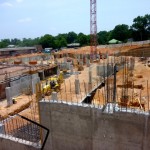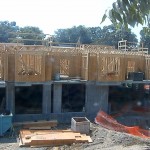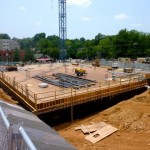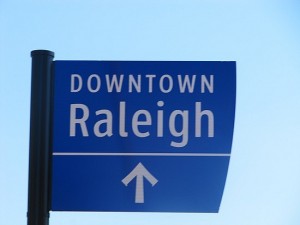
The first time my husband, Jim and I sat over lunch with Kriselie and Manuel was a few years ago at Macaroni Grill at Triangle Town Center, not far from our church located north of I-540. They were considering downsizing from their house in the suburbs, and wondered about the appeals of living downtown Raleigh. Flash ahead to now. With a day’s notice, both couples walked a few blocks from the condo buildings we call home, meeting at Natty Greene’s on Jones Street. Now it was our turn to wonder. What would they say, looking back at how their lives have changed? This is our interview with them.
What was your greatest fear about downsizing and moving downtown? What scared you the most?
Kriselie:
The unknown! I had no idea how it would be, living in a smaller space, inside a city.
I also worried that we were ‘giving away’ our house by selling in a down market. Would we regret that we didn’t wait until the market improved?
Manuel:
We were going against the Play Book!
Everyone we knew was living the American dream with traditional jobs and big houses in the suburbs. Our family and friends were all doubtful about our decision, pointing out how much we were leaving behind.
Kriselie:
I wondered how it would be different without a yard to take care of on weekends. What were we going to do with all that extra time?
Another worry was downsizing, having to do away with things we considered valuable. We decided to do it step by step, and it got easier and easier each time.
Manuel:
Yes, in the beginning Kriselie would look at anything and remember who had given it to her, or where we got it. Now that we’ve already gone through several downsizing stages, we take a look and say, “We don’t need that! Let’s get rid of it!”
What have been the biggest surprises about living downtown?
Manuel:
The people. We immediately met people from different backgrounds. We finally met some couples that have kids AND still want to go out! People live more.
Things are spontaneous and unstructured, so that you can just walk out your front door and join friends for a quick bite or a cup of coffee.
Kriselie:
Many weeks, we go out every single night. There’s always something happening and we can decide whether we want to join in at the last minute.
I love walking to so many places: restaurants, the performing arts center, the amphitheater.
You can’t experience this way of life until you live downtown. It’s freedom. The fun starts the minute you walk out of your house. You see friends and things are happening, not like when you drive your car to an event and nothing starts until you’ve arrived.
We’ve found that with the extra time available not taking care of a yard and house, we can explore many more interests everyday.
Kriselie, the focus of your work has really changed too, from your original job in computer engineering to real estate (R-TownLiving) and Namaste-Beauty.com, a website for make-up instruction and product reviews. How has living downtown influenced those decisions?
Kriselie:
I realized that in my early career, I felt empty. I was into cutting edge computer technology, which meant long hours at work, and then coming home to working late into the night developing software. But in my seven years there, only one or two projects actually became products. It was frustrating.
I really admire people who do what their hearts call them to do. And being connected to others downtown creates a network of people who inspire each other. More and more people are doing what they feel passionate about.
My passion is make up. I always looked at actresses and glamorous women in magazines and wondered how they got that look. Then I came across tutorials on YouTube, where women demonstrated how to do different make up techniques. They became my teachers.
I was inspired. I felt a connection with them. They were the sisters I wish I’d had!
I started practicing and learning, myself. I realized that I might be able to share my learning through my own video. That was hard. Fear kicked in!
Manuel:
Kriselie has always been private, so this felt really exposing.
Kriselie:
But I wanted to share what I loved with others. That was stronger than my fear.
I think of it as one person watching my video, and I’m talking to them. At first it felt really weird and awkward to be talking to the camera.
Showing up with no make up expresses real vulnerability. The first time I saw someone do that, I admired their willingness to reveal themselves, just as they were.
Really, the beauty of internet is that I can communicate without facing a big crowd. I love making videos and blogging. People leave comments! This is a great way of interacting with strangers from all over the world. At some point, those strangers become really close friends.
What’s next? Do you think about the next big move?
Kriselie:
Now that we’ve moved and we have much less baggage, we are more open to moving to another city. But we’re happy right now.
Manuel:
My job connects us here.
We’re very aware of how good this place is, but we’re open to whatever happens. We were in San Francisco recently and thought about how it would be to live there. But it seems that the larger the city, the less influence and connection would be possible.
You could live here maybe ten years and be considered for City Council. In Raleigh, you can talk to the people on City Council and get to know them. That probably isn’t true in a big city, where you might feel like a very small person.
Kriselie:
In Raleigh, you have a say. You know what’s going on. You have a connection.
Raleigh is growing. This is the time to be part of it and see it take off!
Jim and I couldn’t agree more. Thank you, Kriselie and Manuel for your contributions to downtown Raleigh. Whether it’s your videos around town, your BEST or DLA involvement, or your pictures of Raleigh sunrises, your inspiration makes the neighborhood shine!





